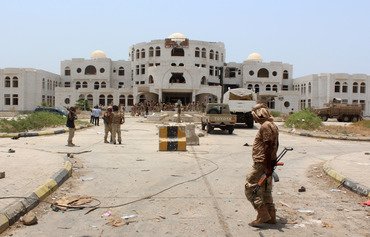Residents of Loder in Yemen's Abyan province forced al-Qaeda to withdraw from the city hours after the group entered it and bombed a security headquarters.
Al-Qaeda elements entered the southern city on February 2nd after the sudden withdrawal of the Security Belt Forces, which are tasked with protecting Abyan and Aden provinces, with backing from coalition forces.
Shortly after the incident, Prime Minister Ahmed Obeid bin Daghr presided over a February 4th meeting with security commanders in Aden and Abyan provinces and the command of the 4th Military Zone.
Security officials reviewed the arrangements put in place to respond firmly to any terrorist or criminal activity in Abyan in order to prevent another breach.
Bin Daghr praised the role of local residents, which he referred to as "popular support", in reinforcing the efforts of the army and security forces to maintain security and stability in their areas and confront all al-Qaeda plots.
He directed all concerned ministries and departments, as well as the 4th Military Zone command, to co-operate with Abyan's local authority and provide the province with the security vehicles and equipment it needs to carry out its work.
This will enable the security apparatus to assert its presence more effectively and will boost its ability to maintain security and stability in the area, he said.
"The Yemeni government will do its part in responding firmly to terrorists operating under any cover or name," he added, in co-operation with the coalition, and will remain an active partner to the international community in fighting terrorism.
The people of Loder confront al-Qaeda
Al-Qaeda elements were able to enter Loder but left hours later after bombing the headquarters of the Security Belt Forces, said Aminah Mohsen, secretary-general of Abyan's local council.
"Al-Qaeda elements took advantage of the withdrawal of the Security Belt Forces from the city and its checkpoints and entered the city," she told Al-Mashareq.
"Residents forced the group’s elements to withdraw by showing their willingness to fight them," she said.
The Security Belt Forces had withdrawn because they had not received their salaries in two months, she explained.
Two days later, on February 4th, Abyan chief of security Abdullah al-Fadhli announced he was resigning from his post.
The demands of the units put under his command had not been met, he said, and they had not received their salaries, allocated food supply or the ammunition needed to carry out pre-emptive strikes against terrorist cells.
Most Security Belt Forces were not natives of the province, Abyan deputy governor Ahmed al-Rahwi told Al-Mashareq.
They came from Daleh, he said, noting that in addition to not receiving their pay, they had to contend with a lack of reinforcement as they faced attacks and improvised explosive devices (IEDs).
Measures to improve security in Abyan
In late January, former popular committees leader Abdul Latif al-Sayed who had fought al-Qaeda in the province since 2011, was appointed as security chief in three Abyan districts, Jaar, Shaqra and Ahwar.
His appointment "will significantly contribute to the enhancement of security and stability in the province", al-Rahwi said.
This will help to address the "constant lawlessness that has been ongoing for about a year because of al-Qaeda’s attacks", he added, noting that the Prime Minister’s meeting affirmed the need to bring back the Security Belt Forces.
"The residents’ co-operation with the Security Belt Forces and the army was an effective factor in defeating al-Qaeda in more than one war, including the liberation of Abyan from al-Qaeda in 2011 and the recent liberation operation in July 2016," said political and security affairs researcher Adnan al-Humairi.
There is a need for "government action to supply the troops and encampments with the necessary military equipment, including ammunition", he told Al-Mashareq.
The government also must "pay attention to the region and meet its urgent developmental needs that contribute to the stability of residents in their areas, and work alongside the army and Security Belt Forces to respond to any move by al-Qaeda", he said.

![Forces loyal to Yemeni President Abd Rabbu Mansour Hadi approach the city of Loder in Abyan province on August 10th, 2015 to drive out the Houthis (Ansarallah). Senior officials recently addressed security needs in the city after a brief al-Qaeda breach. [AFP PHOTO/STR]](/cnmi_am/images/2017/02/07/7187-yemen-loder-security-600_384.jpg)






